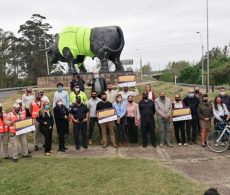News
Filter by
Sport
31.10.20
The 2020 WTCR − FIA World Touring Car Cup will be decided on the weekend of November 14-15 as planned − but at an alternative venue after MotorLand Aragón stepped in to host the final three races of the season.
Sport
30.10.20
EVENT ESSENTIALS What? 2020 WTCR − FIA World Touring Car Cup, Rounds 11, 12 and 13 of 16 When?...
Sport
30.10.20
Next month’s Renties Ypres Rally Belgium (19-22 November) has been cancelled today, Friday October 30, due to surging COVID-19 figures across the country.
Sport
30.10.20
The European Truck Racing Association (ETRA) the promoter of the FIA European Truck Racing Championship, in consultation with the FIA and the local race organiser, has taken a decision to cancel this year’s event at Misano.
Sport
29.10.20
FRIDAY, 30 OCTOBER, 1300 HOURS LOCAL TIME Nicholas Latifi (Williams) George Russell (Williams)...
FIA
29.10.20
We’re delighted that FIA Disability and Accessibility Commission President, racing driver, and co-founder of charity Spinal Track, Nathalie McGloin, has been nominated in The Sunday Times Sportswomen of the Year Awards 2020. Nathalie is shortlisted in the Disability Sportswoman of the Year category, which recognises outstanding performers in disability sport.
Members
29.10.20
As part of National Road Safety Week, the Automóvil Club del Uruguay (ACU) , together with UPM and the Municipality of Paso de los Toros, has launched a major awareness campaign aimed at improving visibility of cyclists and motorcyclists on the roads.
Mobility
29.10.20
The COVID-19 pandemic has changed the mobility patterns for over a billion people around the globe. Governments the world over have focused on managing continuity and implementing programmes to ensure recovery. However, despite the modelling and predictions of what the future may hold, uncertainty abounds. We know the crisis will end, but what will remain of the changes that have been enacted? Will recent initiatives aimed at making urban mobility safer, more sustainable and more accessible remain in place over the long term? Or will they become impractical and inefficient should large sections of the population return to previous mobility habits?










